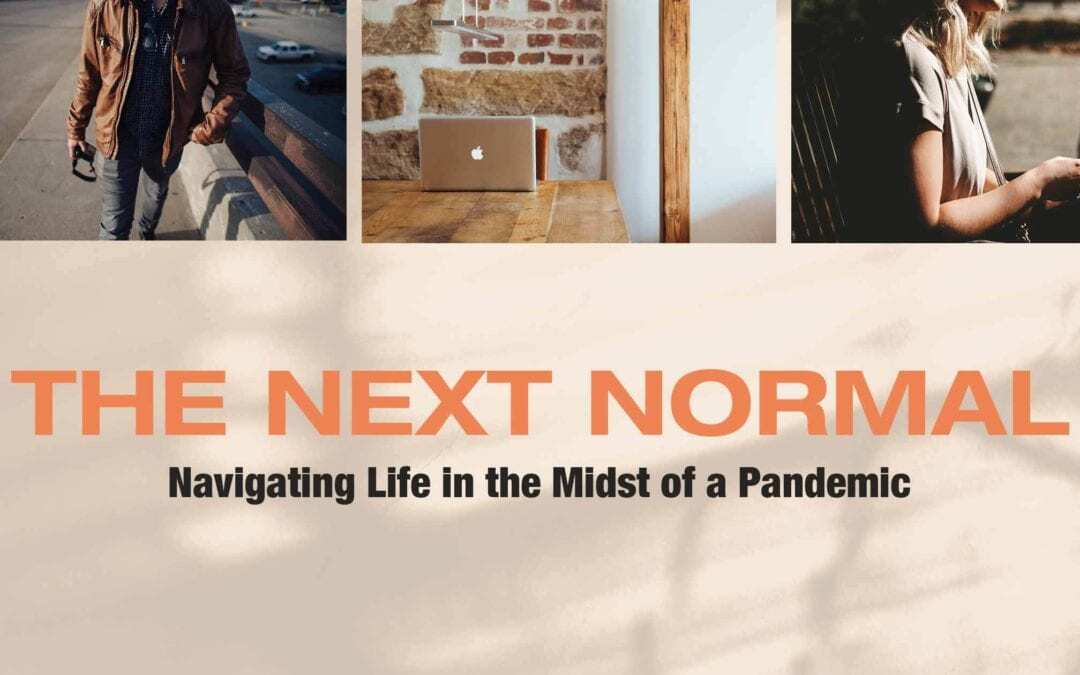Here at Cornerstone, we want to take the next several weeks to dive into considering the “next normal” because we’re all asking ourselves “how to live in a pandemic?” We’ve all certainly experienced some major shifts in our routines. However, it’s probable that (due to the Covid-19 pandemic) our lives will be permanently changed in certain ways. In order to accept this, let’s explore strategies to healthily adjust to these changes in several different areas of our lives.
how mindfulness helps you live in a pandemic
First, let’s catch our breath long enough to have this conversation! If I was sitting across from you in a counseling session, I’d tell you that what you’re feeling has importance. I’d encourage you not to be too hard on yourself during this season. None of us have ever navigated how to live in a pandemic; we’re bound to make some mistakes. Be patient and forgiving towards yourself.
Instead of stifling your feelings, pay attention to them. Our feelings are doing their best to make sure we survive this thing. But sometimes our feelings aren’t always correct, and they could benefit from a rest. Then they can better engage with reality. But how do we effectively rest our feelings?
There’s a psychological principle from renowned psychiatrist Dan Siegel I frequently share with my clients that goes: “Name it to tame it.” Essentially, it’s necessary (and healthy) for us to identify what we’re feeling and thinking. Only after verbalizing these things can we truly influence them in a positive manner.
It’s important that we acknowledge the difficulty of everything that we’ve encountered. We deceive ourselves if we attempt to minimize the hardships that we have faced in this season.
However, acknowledging how our lives have changed might be a painful and disappointing process. There’s a range of emotions that we’ve each had to face. Some of us might feel sadness and depression. Some of us (myself included) might feel jaded or irritated at how this season has provoked tension and division. No matter what you are feeling, the first step in dealing with our pain is to admit exactly what those feelings are.
how your emotions help you live in a pandemic — let it r.a.i.n.
Tuning into our thoughts will allow us to better cope and answer the question “how to live in a pandemic.” The research of Tara Brach offers the following acronym (RAIN) to invite us into greater mindfulness and awareness of our emotional patterns:
Recognize what’s happening at any given moment. In other words: pay attention to what happens in your life from moment to moment! When we experience events that are similar to our past, we often incorrectly assume we “know” how the future is going to unfold. However, assumptions can be wrong. Thus, we need to recognize the uniqueness of this moment. This step is simple to understand, but deceptively difficult to practice.
Allow the experiences to simply be there. Accept that they are happening. Instead of fighting it, which will save yourself some heartache.So often we try to “fix” emotional pain and angst. If you’re anything like me, these endeavors can backfire on you. We’re then left with a greater problem: our original angst, along with a bigger felt need to fix the situation. Allowing simply invites us to accept life’s challenges for what they are.
Investigate with gentle attention. I might find myself snapping at my wife or being short-tempered with my family. While that’s hurtful and unkind to them, it’s important for me to get curious about my reaction instead of judging myself. While I don’t want to excuse hurtful behavior, this step offers an invitation to be patient with ourselves in this process. “Why did I react that way?”In the long run, this gentle approach is much more helpful than judging our performance.
Nurture with self-compassion. This (perhaps most important) aspect of RAIN encourages active cultivation of a sense of patience with ourselves. You’re not perfect. No one can expect you to behave perfectly as you adjust to Covid-19’s impacts. However, sometimes a sense of judgement and condemnation can come most strongly from within ourselves. This aspect of RAIN nudges us toward something that is much more mentally healthy. Additionally, the more we cultivate this for ourselves, the more we will be able to pass it along to others.
Jesus’ Invitation to Mindfulness
When dealing with anxiety, I always consider Matthew 6:25-34. At first read, these verses might inspire a level of anxiety themselves! “Don’t be anxious? What do you mean ‘Don’t be anxious!?’” It can feel like we’re being set up to fail from the get-go.
However, I invite you to notice how Jesus actually encourages a deeper level of mindfulness when combatting anxiety. Essentially he says: “Look closer. The birds aren’t anxious. In their lack of anxiety, they still survive. Or how about the flowers? They’re not stressed about surviving either. And the reason they survive is because they have a Father who is taking care of them.” He invites us to let go of our anxiety so that he can instead lovingly hold it for us. He doesn’t need our help when it comes to getting our needs met.
If I could leave you with one final thought, it would be this: perhaps mindfulness can be our act of worship. When we practice recognizing, allowing, investigating, and nurturing, we are being mindful. We are following the teachings of our empathic savior Jesus Christ, and can experience an even deeper level of love and trust, no matter what changes may come our way. Maybe the best way for how to live in a pandemic, is to do so like Jesus would have.
Invitation
We would love to set you up with one of our professional therapists. Explore our website and read through some of our therapist’s bios. Give us a call with your questions at 303-902-3068 or email us at info@christiancounselingco.com.


